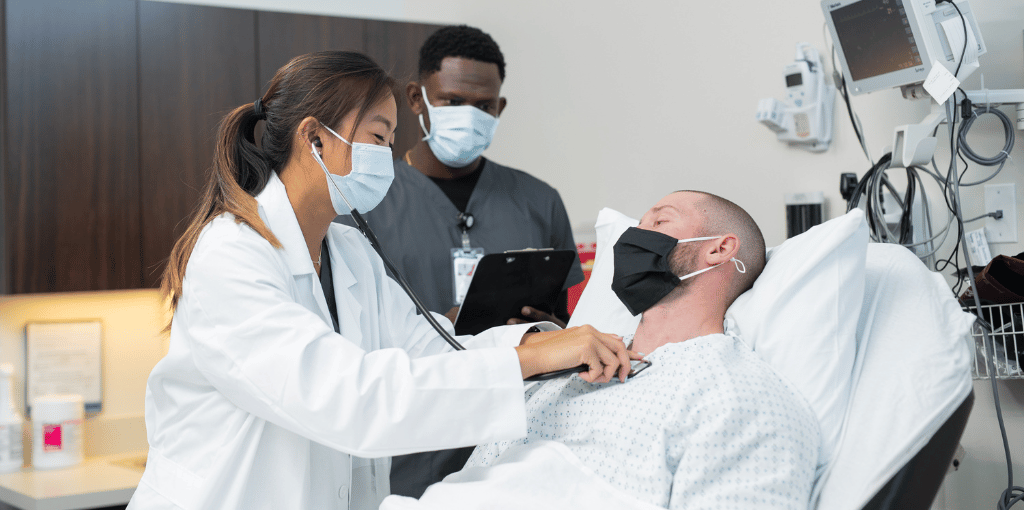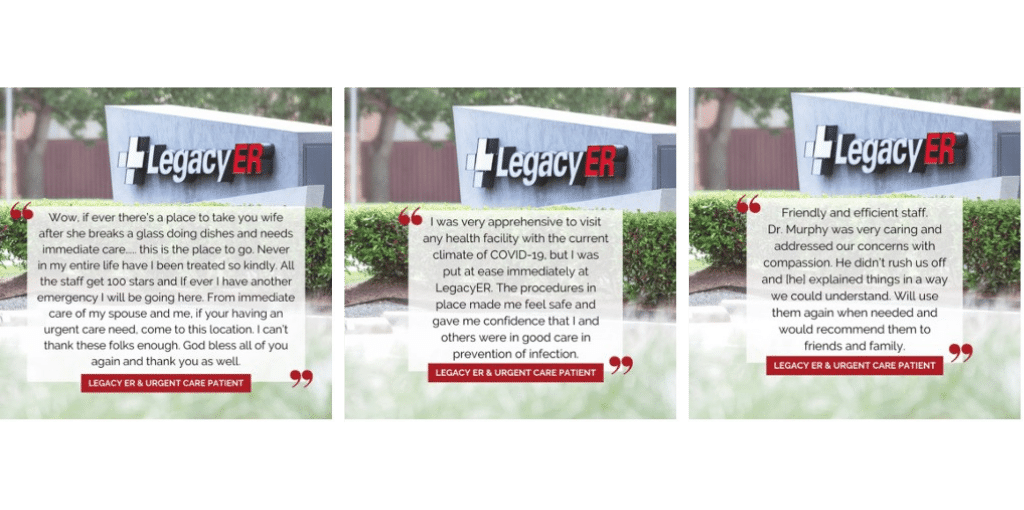What is Patient Experience?
- Category: Consumer Health
- Posted On:

It's no secret that the healthcare industry is evolving, but many may not realize just how important patient experience has become in this changing landscape. Patient-centric approaches to healthcare delivery ensure better clinical outcomes, improved satisfaction levels, and higher revenue margins, leading to an optimized practice that puts its patients first.
Despite the compelling evidence of improved performance, many healthcare organizations struggle to develop effective patient experiences. This post will walk you through the patient experience and how applying this practice as an institutional-wide initiative can help bring in new and returning patients.

Define Patient Experience: Patient experience is an approach to healthcare that places the patient's needs, preferences, and values at the center of care and includes every interaction with a healthcare provider. These interactions occur before, during, and after a patient's visit.
Patient experience can be defined in various ways but generally refers to the patient's overall impression of their healthcare journey. Patient experience goes beyond clinical outcomes or simply satisfaction with care. It encompasses many elements that shape how satisfied someone is with their visit—both tangible (wait times) and intangible (feeling cared for). The patient experience includes (but is not limited to):
- The providers' website
- Ease of parking
- Facility and room temperature
- Cleanliness
- Staff friendliness
- Accessing billing statements or health records electronically
- Ease in scheduling appointments
- Satisfaction with interactions between physicians and other staff
- Communication effectiveness when discussing treatment options
- Understanding out-of-pocket financial costs related to treatments or medications
- The overall quality of services rendered during visits
- Timeliness during service delivery, such as doctor appointment wait times and test results
Patient experience is going to become more and more important as healthcare consumerism continues to grow. Healthcare consumerism is the idea that consumers are more actively involved in healthcare decisions. Therefore, the patient experience plays a crucial role in why consumers choose to visit.

Why Patient Experience is Important?
The value of a positive patient experience cannot be overstated. Research indicates that the quality of patient care can have a powerful effect on their overall health and well-being. A patient experience-centered approach to healthcare means that patients are put first. Every interaction with a healthcare provider is based on their needs and wants.
Studies have demonstrated that patients who receive high-quality care tend to be more satisfied with their healthcare provider's services, which leads to better long-term outcomes and increased loyalty to the healthcare system.
Deloitte's Value of Patient Experience research proved the undeniable link between patient experience and improved health outcomes.
The benefits of enhanced patient experience extend beyond improved health outcomes. Studies show that delivering higher service levels through a focus on patient comfort, convenience, and positive engagement leads to numerous business results, such as improved operational efficiency, reduced costs, greater compliance by patients with treatment protocols, reduced time spent in hospital stays, and decreased readmissions.
Furthermore, research has highlighted that organizations with strong customer experience management programs tend to outperform competitor counterparts financially – often by substantial margins - due to cost reductions and additional revenue earned from increased client satisfaction ratings over time.

Difference Between Patient Experience and Patient Satisfaction
Patient experience is much more than a patient's visit with their doctor or nurse - it incorporates every single touchpoint and communication encountered on the healthcare journey. Whereas patient satisfaction depends on the patient's expectations and whether those expectations were met. While two people may have had identical care services, they could still rate their satisfaction levels differently due to different sets of criteria.
When it comes to how current models view patient experience, it often needs clarification with patient satisfaction. However, the two ideas differ even though patient satisfaction can affect the overall patient experience.
Healthcare Patient Experience Goals
By improving the quality of care with an emphasis on patient experience, providers and medical staff can create innovative solutions to bridge any gaps in their system. This enables patients more control over their healthcare decisions based on individual preferences and values while promoting a collaborative environment among those involved in delivering services. Doing so ultimately leads to positive outcomes such as improved satisfaction, better health results, increased word-of-mouth referrals, and cost-efficiency - all working together towards providing greater overall well-being for individuals within our communities.

How Consumerism is Impacting Healthcare
Consumerism is changing healthcare at an accelerated rate in a shifting economy tinged by inflation, post-pandemic stress and fatigue, work-from-home routines, and changing lifestyles and not to mention AI-guided health information available at their fingertips. Moreover, consumers want an improved healthcare experience. Specifically, they're looking for quality, convenience, and value within their healthcare journey. These factors have led to a patient-centered, retail-quality experience transformed paradigm in healthcare. In addition, increased data, digital transformation, and the pressure to build a brand with stellar customer loyalty drive providers to push past the status quo.
With More Consumers Shopping for Healthcare, How Does the Patient Experience Affect Their Decision-Making?
Providers must pay attention to their patient experience to be competitive in delivering quality care. The patient experience plays a major role in healthcare decision-making for consumers, as it is often deciding whether someone chooses to use a particular provider or service. Research suggests that when people shop for healthcare, they look not just at quality and cost but also at how easy the process of using that service is.
Patients have come to expect certain benefits from healthcare providers, such as convenience, speed of access, and helpfulness. They also increasingly value booking appointments online or even not having to book at all, and quickly receiving medical records via secure methods like HIPAA-compliant portals. Providers must ensure they meet these expectations by investing in technologies like customer relationship management (CRM) tools so customers can easily manage their appointments online or through mobile applications, online scheduling systems, automated appointment reminder systems, telehealth services, and integrated payment portals. They should also leverage data analytics technology to identify trends related to outages or wait times within their system or other potential issues with their patient satisfaction surveys so they can address them accordingly.
Providers should also focus on providing personalized care experiences tailored specifically for each customer's needs - this could include offering more comprehensive advice about preventive measures and lifestyle changes beyond traditional treatments, educating patients about items like insurance coverage options and payment plans available for those who cannot afford treatment upfront; providing digital access solutions so patients always have access even when outside the office visit environment; customizing follow-up plans based on progress reports sent directly from home monitoring devices between visits - all of which will result in better outcomes and higher customer satisfaction ratings.

Customer Service in Healthcare
Customer service is the cornerstone of providing patients with positive experiences and meeting their expectations. The primary values of customer service include communication, responsiveness, and respect. Often, patients seeking medical help are vulnerable and require healthcare professionals who effectively communicate their treatment and care methods. Good customer service is essential in healthcare and significantly impacts the patient experience.
Healthcare providers and healthcare organizations that have already established customer service as a core value for their health facilities are better equipped to implement new steps to improve patient experiences. As more health facilities look to invest in methods of the patient experience, they must first recognize the cultural and institutional changes that need to be made.
How Do You Measure Patient Experience?
A common thread among healthcare providers who provide consistent patient experiences measures their impact. Measuring patient experience gives valuable insight into how patients feel about their care. It allows healthcare providers to identify areas that need improvement and enables them to adapt their service accordingly.
There are a few different approaches that can be used when measuring patient experience:
Patient Satisfaction Surveys
These provide direct patient feedback on specific aspects of their care, such as wait times, communication with clinicians and staff, cleanliness of the facility, etc. This type of feedback is generally gathered via questionnaire forms or interviews conducted in person, by phone or online. Intuitive Health uses Net Promoter Score it measure patient experience and patient satisfaction.
Patient Experience Reports
Usually conducted by third-party research organizations, these reports measure patients' overall satisfaction with their care through surveys and interviews which assess multiple areas such as comfort levels in the waiting room/examination room, respectfulness and responsiveness of the medical team, safety protocols followed and quality and timeliness of treatments received etc.
Patient Complaints
Investigating patient complaints can often reveal issues related to providing poor quality care, which may have otherwise gone unnoticed due to a lack of formalized patient experience measures at the facility. Interpreting complaint data also helps facilities spot trends (e.g., why certain departments get more negative reviews than others) so they can develop targeted strategies for improvement where needed most urgently.
Focus Groups
By gathering quantitative and qualitative data from a group of patients, healthcare providers can gain insight into the effectiveness of their services. Focus groups are often used to understand patient experience because they provide an opportunity for open dialogue and feedback on how certain practices may be improved or changed. As a result, patients can offer valuable information about the quality and satisfaction of their care and potential areas for improvement. This enables healthcare providers to make adjustments that could improve outcomes for current and future patients.
Patient Experience Survey
As a provider of retail healthcare, Intuitive Health, and its partner systems all use the Net Promoter Score, or "NPS," to measure patient satisfaction, a type of patient experience survey. NPS is a widely used customer loyalty metric that estimates how likely customers are to recommend a business, product or service to others. It is calculated by asking customers: "On a scale of 0-10, how likely are you to recommend our [product/service] to a friend or family member?"
Customers who answer nine or 10 are deemed "promoters," and those who answer zero to six are classified as "detractors." Answers of seven and eight fall between and can be considered "passives." NPS is then calculated by subtracting the percentage of detractors from the percentage of promoters. A positive score indicates an above-average level of customer loyalty, whereas negative scores indicate below-average customer satisfaction.
Net Promoter Score has been widely accepted as one of the most effective metrics for gauging customer loyalty due to its simplicity and effectiveness. As a result, many companies use it as part of their overall customer experience strategy, providing insight into existing initiatives and areas where improvement could lead to increased customer satisfaction. NPS is also highly correlated with key performance indicators such as customer lifetime value (CLV), customer satisfaction (CSAT) scores, conversion rates and word-of-mouth referrals. As a result, it is a valuable tool for businesses looking to optimize their marketing efforts.
After every visit, every Intuitive Health patient is sent one question survey to complete based on their experience at the health center. Intuitive Health is unique because the survey responses are shared with the center's team in real-time. Providers can give patients a unique experience that sets them apart by collecting and acting on patient feedback. The Net Promoter System is ideal for practitioners to create meaningful connections with their clients for improved satisfaction and loyalty.
Each year, Intuitive Health collects responses from 60,000 respondents, of which 92% are promoters, who rank their satisfaction between nine and 10 on a scale from one to 10. As a result, intuitive Health facilities are ranked in the top 1% of all global retailers and share the space with some of the most recognized customer service companies.
Intuitive Health was even able to improve its NPS during the pandemic. If you are interested in learning more, listen to CustomerGauge's podcast.

The Patient Journey
The patient journey in healthcare is a term used to describe each patient's path of care. It encompasses various activities, services, and interactions between patients and health providers throughout their medical encounters.
The patient journey begins before the initial visit when a person starts to plan their overall medical care - such as researching potential healthcare options and scheduling appointments. Then during the visit, it includes events like discussing diagnosis or treatment plans with clinicians, receiving information about medications, having tests performed or administered by the provider team, asking questions related to one's condition or prognosis, and so on.
Following this comes the post-visit follow-up, which can consist of additional visits to specialists or primary care physicians if required; seeking advice from friends/family/online resources; taking prescribed medication; engaging in recommended lifestyle changes such as exercising more often; attending scheduled imaging scans etc.
The purpose of describing a patient's journey is to assist healthcare providers in understanding what patients go through during their medical encounters with them - from the beginning through recovery - thus improving the quality of care received by every individual seeking help. It's an invaluable tool that allows us to better understand where vulnerable points exist along any particular route so they can be addressed accordingly while also recognizing what opportunities may be available for enhancing overall service delivery models regarding certain aspects at various stages throughout this process.

Patient-centered care and patient experience are essential to improved health outcomes and increased revenue. Organizational leaders must be mindful of how they are investing in this space and the level of priority they are placing on initiatives. From focusing on well-rounded communication strategies to utilizing practical technologies like medical alert systems and remote healthcare services, there are various solutions that can foster meaningful relationships between practitioners and their patients. For healthcare organizations looking to increase their success, implementing a comprehensive patient experience strategy can help them make better decisions for their practice, develop trustful relationships with their patients and ultimately meet their goals.
Patients are tired of long waits and poor customer service when it comes to healthcare. They deserve better. Intuitive Health is transforming the way healthcare is delivered with revolutionary technology and a multi-pronged approach that streamlines stand operating procedures, reduces waiting periods, provides outstanding customer service, and ensures high-quality medical care.
Intuitive Health believes everyone should have access to quality healthcare and this drives them forward as an innovator in this space, striving for continuous improvement every step of the way. With their commitment to excellence in all aspects of patient care, now patients can get the kind of health services they need quickly and conveniently.
Visit www.iheruc.com/about/benefits-of-dual-model-er-urgent-care today and explore how Intuitive Health can help you with your patient experience.

.png)
